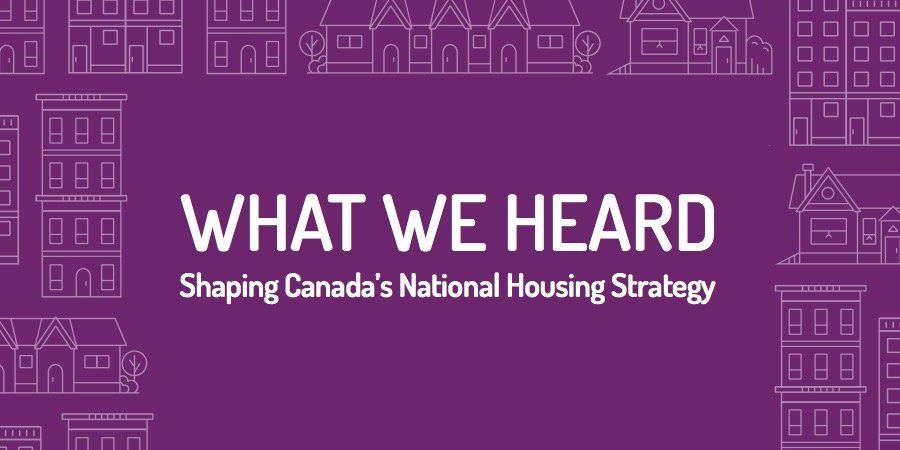Let’s Talk Housing!
The Canadian government just released its housing strategy plan, called “What We Heard, Shaping Canada’s National Housing Strategy”. It has been included below in all its 66 page glory, but first here are some of the highlights.
Helping those in greatest need . It is clear that Canadians are united in wanting better housing outcomes – not just for themselves, but for individuals and families with the most severe housing needs, including low-income Canadians, the homeless and victims fleeing violence.
Helping Indigenous peoples achieve better housing outcomes for themselves . Indigenous peoples told us that a separate, but parallel strategy is needed to address the unique housing challenges facing Métis, Inuit and First Nations peoples living on and off reserve, in cities and remote areas, and in the North and bring housing need levels on par with non-Indigenous peoples.
Eliminating homelessness . A fundamental goal of a National Housing Strategy should be to eliminate homelessness in Canada, and short of that, make it rare, brief and non-recurring. The needs of homeless Canadians, who fall at the extreme end of the housing spectrum, ought to be prioritized.
Making housing more affordable . Canadians said housing they can afford and that meets their needs was the most important housing outcome. The lack of affordable, suitable and adequate housing is especially a concern for low-income households and other vulnerable Canadians across the country.
Adopting a housing systems perspective . Canadians told us they expect a National Housing Strategy to better coordinate the various housing initiatives already in motion across the country and to tackle housing needs across the entire continuum.
Housing policies and programs should centre on people and place . All recognized the need for housing solutions to be people-focused so that individuals and families have access to jobs, schools and supports in order to participate in their communities and help lift them out of poverty. Canadians also want housing located in safe neighbourhoods with day-care facilities, community services, public transportation, recreational and other amenities nearby.
Setting clear outcomes and targets . You told us that a national strategy must set clear outcomes and measurable targets in order to report back to Canadians on progress in achieving better housing.
Delivering long-term and predictable funding . We heard loud and clear from housing providers and developers that long-term and stable funding is necessary to plan and deliver more affordable housing. Similarly, access to innovative financing and affordable lands will also help alleviate affordable housing gaps.
Realizing the right to housing . Canadians said a national housing strategy should examine whether our laws, policies and practices are sufficient to prevent homelessness, forced evictions, and discrimination in having adequate housing.
Improving data collection, analysis and research . Canadians and housing experts stressed that more and better housing data is needed to understand housing conditions and the housing needs of Canadians, and in order to develop informed, cost-effective, policies, programs and initiatives.
Taking a collaborative approach to housing . Canadians told us that a National Housing Strategy should take an integrated approach, building on the capacity of all orders of government and other partners. Clear collaboration and flexible solutions are necessary to achieve a national vision of housing.
What We Heard by Mortgage Resources on Scribd
Katherine Martin
Origin Mortgages
Phone: 1-604-454-0843
Email: kmartin@planmymortgage.ca
Fax: 1-604-454-0842
RECENT POSTS






